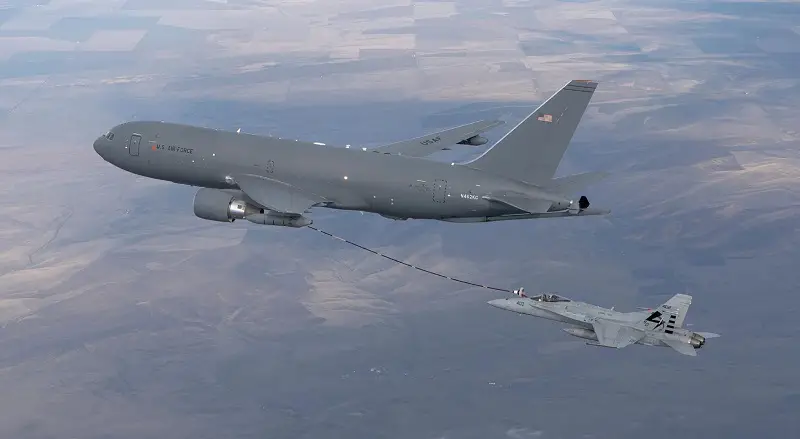Boeing and Aurora Flight Sciences are investing in further developing advanced defensive systems and countermeasures for application on next-generation refueling and mobility platforms including the KC-46A Pegasus tanker. Aurora Flight Sciences, a Boeing company, is leading the research and conceptual design of composite components to enhance operational survivability for aerial refueling and mobility missions. This work will also focus on producibility and manufacturing at Aurora’s Columbus, Miss., manufacturing facility. Aurora Flight Sciences develops and applies innovative solutions to advance the future of flight. Its facility in Mississippi specializes in producing composite components and sub-assemblies for the aerospace industry, such as the composite skin for Boeing’s MQ-25 Stingray, the world’s first autonomous aerial refueler, which provide lightweight strengthening and anti-corrosive benefits that are crucial for the carrier-based aircraft.
“We excel at bringing futuristic concepts to life. With our research and development expertise, the composites production talent at Aurora Mississippi and our collaboration with Boeing, we’re building the future of next-generation refueling and mobility capabilities and growing the team to deliver them,” said Luke Colville, vice president of Aurora manufacturing and aerosystems.
“The KC-46A already features defensive systems that are unprecedented in a tanker. We continue to evolve the KC-46A and other next-generation refueling and mobility platforms to further enhance mission versatility and survivability,” said Justin Hatcher, advanced technology director for Boeing’s KC-46 Program.
Operationally deployed for global combat operations, the KC-46A features defensive systems and data integration for multi-mission aerial refueling support closer to the battlespace than existing tankers. With more data for the crew and fleet, including recent Block 1 upgrades to further enhance connectivity, the Pegasus can see and relay threat information to joint force warfighters for greater fleet survivability and mission success. Mississippi is one of more than 40 states with workforce supporting the KC-46 program and its supplier network of about 37,000 U.S.-based employees. Aurora Mississippi leverages partnerships with Mississippi State University, including the MSU Advanced Composites Institute for employee training, as well as other institutions in Mississippi’s nexus of higher education and workforce development, such as East Mississippi Community College.
The Boeing KC-46 Pegasus is an American military aerial refueling and strategic military transport aircraft developed by Boeing from its 767 jet airliner. In February 2011, the tanker was selected by the U.S. Air Force as the winner in the KC-X tanker competition to replace older Boeing KC-135 Stratotankers. The first aircraft was delivered to the Air Force in January 2019. The KC-46 Pegasus is a variant of the Boeing 767 and is a widebody, low-wing cantilever monoplane with a conventional empennage featuring a single fin and rudder. It has a retractable tricycle landing gear and a hydraulic flight control system. The Pegasus is powered by two Pratt & Whitney PW4062 engines, one mounted under each wing. It has been described as combining “the 767-200ER’s fuselage, with the 767-300F’s wing, gear, cargo door and floor, with the 767-400ER digital flightdeck and flaps”. The U.S. Air Force intends to procure 179 Pegasus aircraft by 2027.













